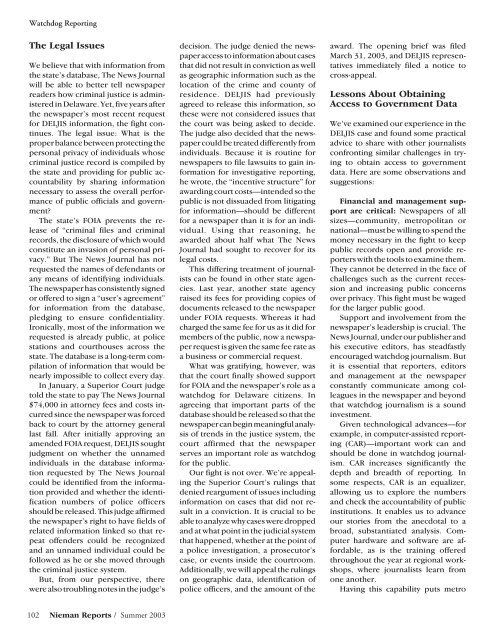summer-2003-Part 2-live - Nieman Foundation - Harvard University
summer-2003-Part 2-live - Nieman Foundation - Harvard University
summer-2003-Part 2-live - Nieman Foundation - Harvard University
- No tags were found...
Create successful ePaper yourself
Turn your PDF publications into a flip-book with our unique Google optimized e-Paper software.
Watchdog ReportingThe Legal IssuesWe believe that with information fromthe state’s database, The News Journalwill be able to better tell newspaperreaders how criminal justice is administeredin Delaware. Yet, five years afterthe newspaper’s most recent requestfor DELJIS information, the fight continues.The legal issue: What is theproper balance between protecting thepersonal privacy of individuals whosecriminal justice record is compiled bythe state and providing for public accountabilityby sharing informationnecessary to assess the overall performanceof public officials and government?The state’s FOIA prevents the releaseof “criminal files and criminalrecords, the disclosure of which wouldconstitute an invasion of personal privacy.”But The News Journal has notrequested the names of defendants orany means of identifying individuals.The newspaper has consistently signedor offered to sign a “user’s agreement”for information from the database,pledging to ensure confidentiality.Ironically, most of the information werequested is already public, at policestations and courthouses across thestate. The database is a long-term compilationof information that would benearly impossible to collect every day.In January, a Superior Court judgetold the state to pay The News Journal$74,000 in attorney fees and costs incurredsince the newspaper was forcedback to court by the attorney generallast fall. After initially approving anamended FOIA request, DELJIS soughtjudgment on whether the unnamedindividuals in the database informationrequested by The News Journalcould be identified from the informationprovided and whether the identificationnumbers of police officersshould be released. This judge affirmedthe newspaper’s right to have fields ofrelated information linked so that repeatoffenders could be recognizedand an unnamed individual could befollowed as he or she moved throughthe criminal justice system.But, from our perspective, therewere also troubling notes in the judge’sdecision. The judge denied the newspaperaccess to information about casesthat did not result in conviction as wellas geographic information such as thelocation of the crime and county ofresidence. DELJIS had previouslyagreed to release this information, sothese were not considered issues thatthe court was being asked to decide.The judge also decided that the newspapercould be treated differently fromindividuals. Because it is routine fornewspapers to file lawsuits to gain informationfor investigative reporting,he wrote, the “incentive structure” forawarding court costs—intended so thepublic is not dissuaded from litigatingfor information—should be differentfor a newspaper than it is for an individual.Using that reasoning, heawarded about half what The NewsJournal had sought to recover for itslegal costs.This differing treatment of journalistscan be found in other state agencies.Last year, another state agencyraised its fees for providing copies ofdocuments released to the newspaperunder FOIA requests. Whereas it hadcharged the same fee for us as it did formembers of the public, now a newspaperrequest is given the same fee rate asa business or commercial request.What was gratifying, however, wasthat the court finally showed supportfor FOIA and the newspaper’s role as awatchdog for Delaware citizens. Inagreeing that important parts of thedatabase should be released so that thenewspaper can begin meaningful analysisof trends in the justice system, thecourt affirmed that the newspaperserves an important role as watchdogfor the public.Our fight is not over. We’re appealingthe Superior Court’s rulings thatdenied reargument of issues includinginformation on cases that did not resultin a conviction. It is crucial to beable to analyze why cases were droppedand at what point in the judicial systemthat happened, whether at the point ofa police investigation, a prosecutor’scase, or events inside the courtroom.Additionally, we will appeal the rulingson geographic data, identification ofpolice officers, and the amount of theaward. The opening brief was filedMarch 31, <strong>2003</strong>, and DELJIS representativesimmediately filed a notice tocross-appeal.Lessons About ObtainingAccess to Government DataWe’ve examined our experience in theDELJIS case and found some practicaladvice to share with other journalistsconfronting similar challenges in tryingto obtain access to governmentdata. Here are some observations andsuggestions:Financial and management supportare critical: Newspapers of allsizes—community, metropolitan ornational—must be willing to spend themoney necessary in the fight to keeppublic records open and provide reporterswith the tools to examine them.They cannot be deterred in the face ofchallenges such as the current recessionand increasing public concernsover privacy. This fight must be wagedfor the larger public good.Support and involvement from thenewspaper’s leadership is crucial. TheNews Journal, under our publisher andhis executive editors, has steadfastlyencouraged watchdog journalism. Butit is essential that reporters, editorsand management at the newspaperconstantly communicate among colleaguesin the newspaper and beyondthat watchdog journalism is a soundinvestment.Given technological advances—forexample, in computer-assisted reporting(CAR)—important work can andshould be done in watchdog journalism.CAR increases significantly thedepth and breadth of reporting. Insome respects, CAR is an equalizer,allowing us to explore the numbersand check the accountability of publicinstitutions. It enables us to advanceour stories from the anecdotal to abroad, substantiated analysis. Computerhardware and software are affordable,as is the training offeredthroughout the year at regional workshops,where journalists learn fromone another.Having this capability puts metro102 <strong>Nieman</strong> Reports / Summer <strong>2003</strong>
















